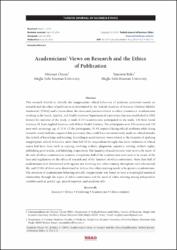| dc.contributor.author | Özcan, Müesser | |
| dc.contributor.author | Balcı, Yasemin | |
| dc.date.accessioned | 2020-11-20T15:02:46Z | |
| dc.date.available | 2020-11-20T15:02:46Z | |
| dc.date.issued | 2016 | |
| dc.identifier.issn | 1308-4070 | |
| dc.identifier.issn | 2149-8148 | |
| dc.identifier.uri | https://doi.org/10.12711/tjbe.20169.0006 | |
| dc.identifier.uri | https://hdl.handle.net/20.500.12809/2590 | |
| dc.description | WOS: 000439229100004 | en_US |
| dc.description.abstract | This research intends to identify the inappropriate ethical behaviors of academic personnel mostly on research and the ethics of publication as determined by the Turkish Academy of Sciences (Turkiye Bilimler Akademisi [TUBA]) and to learn about the views and practices related to ethics committees. Academicians working in the Social, Applied, and Health Sciences Department of a university that was established in 1992 formed the universe of the study. A total of 275 academicians participated in the study, 136 from Social Sciences, 91 from Applied Sciences, and 48 from Health Sciences. The participants were 156 women and 119 men with an average age of 37.9. Of the participants, 70.4% reported facing ethical problems while doing research; nearly half also reported that previously they could have unintentionally made an ethical mistake due to lack of knowledge and training. According to academicians' views related to the situation of applying inappropriate ethical behaviors, more than half of the respondents thought that more violations of ethical issues had been done such as copying, crediting authors, plagiarism, repetitive writing, authorS rights, publishing good results, and falsifying, respectively. The majority of academicians were seen to be aware of the task of ethics committees to examine complaints; half of the academicians were seen to be aware of the laws and regulations on the ethics of research and of the function of ethics committees. More than half of academicians were determined to be against not receiving any ethics training throughout ones educational life, and 93.8% of them were determined to believe that ethics training needs to be given to academicians. The situation of academicians behaving ethically inappropriate was found to have a meaningful statistical relationship through the topics of ethics committees and the need of ethics training among independent variables such as gender, age, area of expertise, and academic title. | en_US |
| dc.item-language.iso | eng | en_US |
| dc.publisher | Igiad-Turkish Entrepreneurship & Business Ethics Assoc | en_US |
| dc.item-rights | info:eu-repo/semantics/openAccess | en_US |
| dc.subject | Research | en_US |
| dc.subject | Ethics | en_US |
| dc.subject | Publishing | en_US |
| dc.subject | Academician | en_US |
| dc.subject | Ethics Violation | en_US |
| dc.title | Academicians' Views on Research and the Ethics of Publication | en_US |
| dc.item-type | article | en_US |
| dc.contributor.department | MÜ, Tıp Fakültesi, Temel Tıp Bilimleri Bölümü | en_US |
| dc.contributor.institutionauthor | Özcan, Müesser | |
| dc.contributor.institutionauthor | Balcı, Yasemin | |
| dc.identifier.doi | 10.12711/tjbe.20169.0006 | |
| dc.identifier.volume | 9 | en_US |
| dc.identifier.issue | 1 | en_US |
| dc.identifier.startpage | 103 | en_US |
| dc.identifier.endpage | 111 | en_US |
| dc.relation.journal | Turkish Journal of Business Ethics | en_US |
| dc.relation.publicationcategory | Makale - Uluslararası Hakemli Dergi - Kurum Öğretim Elemanı | en_US |


















